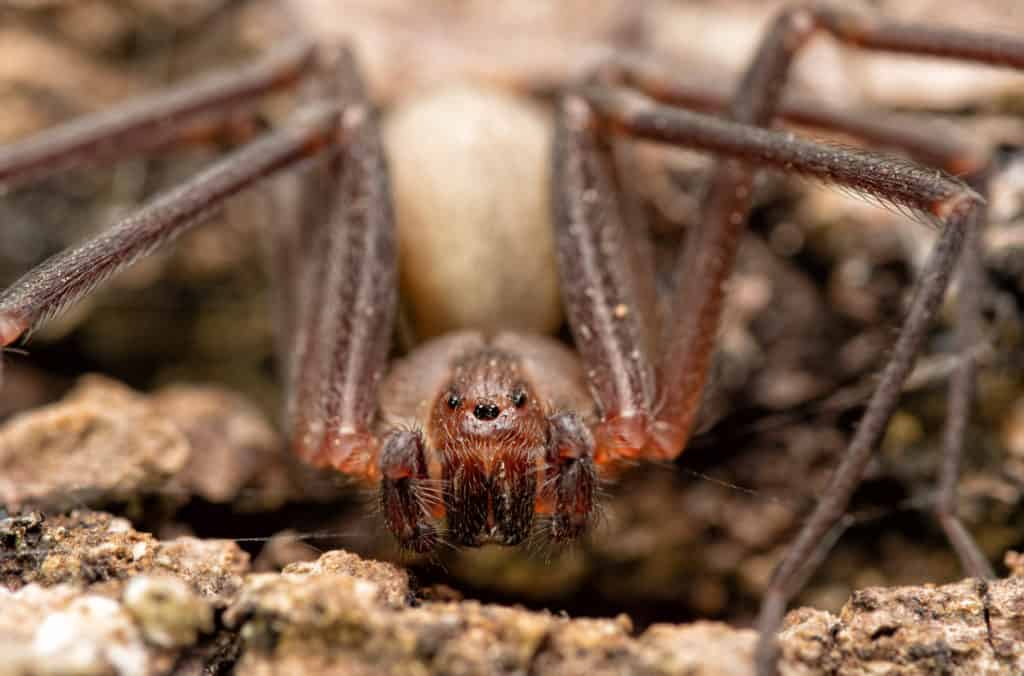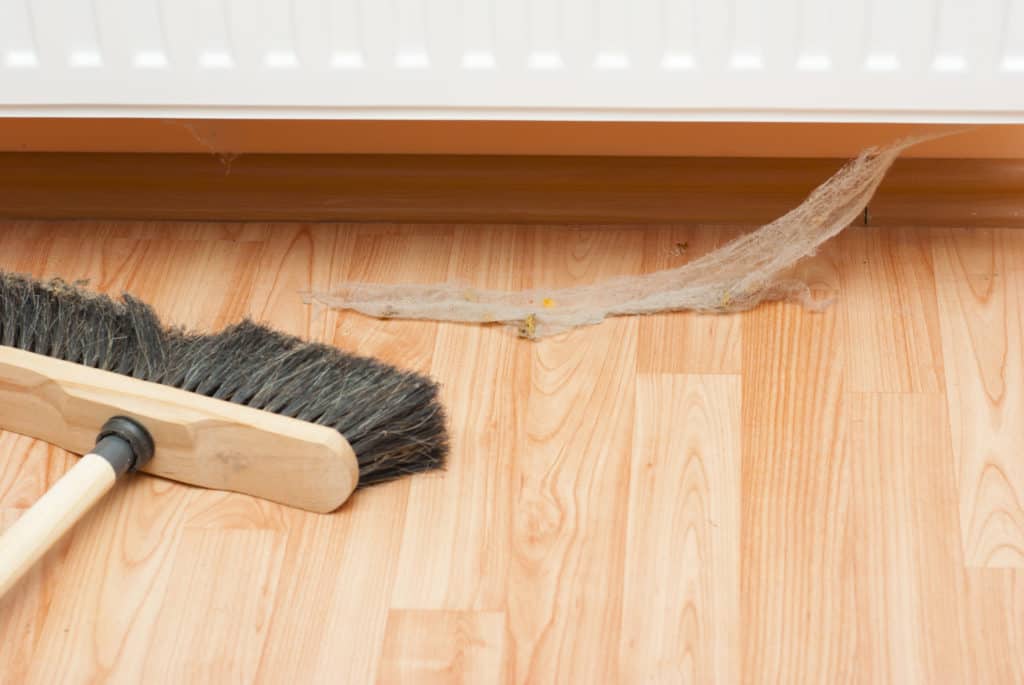Dangers of the Brown Recluse
Dangers of the Brown Recluse
An Infamous Loner
The name Brown Recluse came from the spiders’ tendency to be shy and reclusive. They usually hide out in areas that are dark such as the corners, under furniture and in closets. These spiders have six eyes within three different pairs. They are about a quarter in size and range from light brownish/yellow to brown.
Known scientifically as Loxosceles reclusa, brown recluses are the most widespread in the united states and is part of the Loxoceles family within the Arachnida class. These spiders can live up to six months without sustenance, but when they have prey available, they feed on insects and other arthropods, even other brown recluse spiders.

Bad Bites
Brown recluse may not out to harm anyone, but they will bite if they feel harmed. Their jaws are not very strong, and, as such, the spider’s pinchers will struggle to penetrate human skin in the absence of counter pressure. However, this is not unlikely to occur when in contact with a brown recluse. The elusive arachnid prefers to remain hidden, and most encounters with them are accidental when picking up a box or toy, moving an old piece of furniture, etc. In these cases, your hand or arm may unintentionally come in direct contact with the spider, causing them to strike out in defense. This added pressure of your hand against the spider is enough to allow them to bite through your skin, injecting their venom into your blood stream.
These bites are very painful, although unlike the bite of the black widow, the pain is localized and accompanied by a stinging sensation. These bites originally develop into a blister before eventually splitting into a lesion and, in severe cases, can cause skin necrosis – destruction of the skin tissue.
How Do You Get Brown Recluse?
Being such a reclusive creature, it would be logical that these spiders would want to avoid homes. Homes are full of human and pet activity, causing high traffic and an overwhelming chance of being encountered. There’s also often more of a lack of sustenance due to human activity limiting the amount of available insects. Despite all of these reasons however, brown recluse actually occupy homes rather frequently. So why do they like coming into homes?
Well, when brown recluse find areas such as attics and basements, it is rarely even a second thought for these spiders to begin spinning their webs. These places are ideal for loner arachnids as they tend to be dark, quiet/undisturbed, sometimes cluttered when used for storage, and provides some protection from outdoor elements and potential predators. Also, if spiders can find their way into these areas of your home, it is rather likely that other insects have also discovered these same entry points, thereby providing a constant stream of meals for the spiders.

Stay Safe
It is important to try an avoid run ins with brown recluse as there is no antidote to their venom. The first step to avoiding them is sealing off your home against any little invaders. If other insects are getting in, you’re bound to have spiders right on their heels, following their prey right into your house. Once your home is sealed here are some other steps you can take to get rid of any brown recluse spiders and prevent them from returning:
- Eliminate all of their webs – vacuum them up or tear them down with dusters or brooms.
- Vacuum – keep your floors clean and use vacuum attachments to get in corners and under furniture. The more often you vacuum, the less likely you are to have any bugs sticking around.
- Clear the way around your house – make sure that any garbage cans, piles of firewood, debris, etc. is away from the exterior walls of your home as these are places that pests love to inhabit and, when they’re in close proximity to your home, it can encourage the pests to find a way inside.
- Eliminate sources of moisture – if you have any dripping pipes or a humid basement, this could be attracting spiders.
- Screen maintenance – inspect and repair any torn or damaged window screens.
Even when you’re trying to be careful, there’s still a chance you may come across one of these arachnids and, if bitten, such an encounter should be taken extremely seriously. It is recommended that you seek medical treatment immediately as their bites can be fatal in extreme cases. While waiting for medical assistance however, you can take the following steps to reduce the effects of the bite and put yourself in the best position for survival in the case of a serious reaction to the venom:
- Stay calm and notify others that you need treatment
- DO NOT attempt to remove the venom
- Elevate the bite area if possible
- Apply a cold compress to reduce swelling
- Wash the bite with soap and water
- Call Poison Control and/or 911
If you suspect that your home has unwelcome venomous visitors, we recommend that you call in the professionals right away. Dealing with these types of arachnids can be dangerous and should only be handled by trained technicians with experience with these types of pests so that the issue can be treated quickly and effectively. Call us today if you suspect you may have a brown recluse issue in your home.

Citation
Brown Recluse (no date) Urban and Structural Entomology Program at Texas A&M University. Texas Forest Secvice. Available at: https://urbanentomology.tamu.edu/spiders/brown-recluse/ (Accessed: January 5, 2021).
The Difference Between an Insect and an Arachnid (2020) Allan’s Pet Center. Available at: https://allanspetcenter.com/the-difference-between-an-insect-and-an-arachnid/ (Accessed: October 2020).
Mekonnen, S. (2019) Brown Recluse Spider Bites, Poison Control. National Capital Poison Center. Available at: https://www.poison.org/articles/2014-oct/brown-recluse-spider-bites (Accessed: January 5, 2021).
Taxonomy (2020) Basic Biology. Available at: https://basicbiology.net/biology-101/taxonomy (Accessed: October 2020).
Venomous Spiders (2018) Centers for Disease Control and Prevention. The National Institute for
Occupational Safety and Health. Available at: https://www.cdc.gov/niosh/topics/spiders/default.html (Accessed: April 2020).
How to Maintain a Pest-Free Kitchen for the Holidays
How to Maintain a Pest-Free Kitchen for the Holidays How to Maintain a Pest-Free Kitchen for the Holidays Summary: This blog educates homeowners [...]
Pests That Invade Packages & Boxes: How to Prevent Hidden Infestations
Pests That Invade Packages & Boxes: How to Prevent Hidden Infestations Pests That Invade Packages & Boxes: How to Prevent Hidden Infestations Summary: [...]
Keep Pests Out of Your Holiday Gatherings
Keep Pests Out of Your Holiday Gatherings Keep Pests Out of Your Holiday Gatherings Summary: The holiday season is all about good food [...]
Cold Weather vs. Warm Weather Infestations: How Temperature Shapes Pest Activity
Cold Weather vs. Warm Weather Infestations: How Temperature Shapes Pest Activity Cold Weather vs. Warm Weather Infestations: How Temperature Shapes Pest Activity Summary: [...]
Garden Pests Do Not Hibernate Indoors – How They Attack Houseplants And What To Do
Garden Pests Do Not Hibernate Indoors – How They Attack Houseplants And What To Do Garden Pests Do Not Hibernate Indoors – How They Attack [...]
The Scariest Pests (And Why They Freak Us Out)
The Scariest Pests (And Why They Freak Us Out) The Scariest Pests (And Why They Freak Us Out) Summary: A practical, homeowner-friendly guide [...]

